Montana Youth Climate Suit
Air Date: Week of July 7, 2023
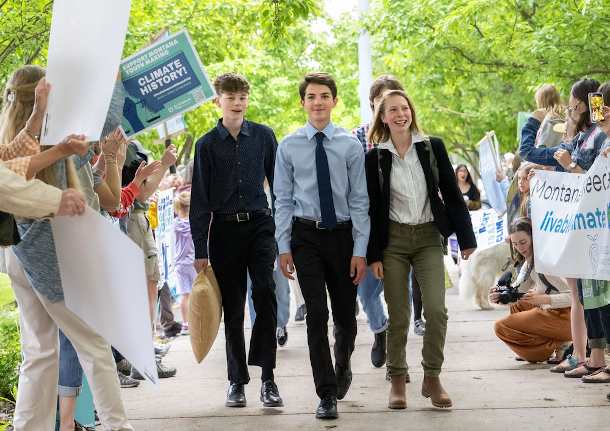
Youth plaintiffs Badge Busse, Mica Kantor, and Eva L. are cheered on by supporters as they arrive for their second day of trial. (Photo: Robin Loznak/Courtesy of Our Children’s Trust)
A case in Montana brought by sixteen youth plaintiffs has become the first constitutional climate suit in the U.S. to make it to trial. They allege that the state of Montana has violated their constitutional right to a “clean and healthful environment” by promoting fossil fuel extraction in the face of intensifying climate disruption. Inside Climate News reporter Richard Forbes was in the courtroom and fills in Host Jenni Doering on what happened and how the young plaintiffs’ powerful testimony contrasted with a bare-bones defense from the state.
Transcript
CURWOOD: From PRX and the Jennifer and Ted Stanley Studios at the University of Massachusetts Boston, this is Living on Earth. I’m Steve Curwood.
DOERING: And I’m Jenni Doering.
In June, a case called Held v. Montana became the first constitutional climate lawsuit in the U.S. to make it to trial. 22-year-old Rikki Held and fifteen fellow young plaintiffs allege that their state’s actions to promote fossil fuel extraction in the face of intensifying climate disruption violate their right to a “clean and healthful environment,” which is codified in Montana’s constitution. Their state and the world are already feeling the effects of the climate emergency, from extreme weather to wildfire smoke and ever-warming temperatures. The global average temperature reached a new record high on July 4, at 62.92 degrees Fahrenheit, breaking the record set just the day before. Facing down a future of even more warming, the young plaintiffs are asking the state of Montana to enact a plan for a clean energy transition. Richard Forbes is an environmental journalist focusing on the intersection between climate change and mental health, and he’s been covering the trial for our media partner Inside Climate News. Richard joins us now from Missoula to discuss the case. Thanks for joining us!
FORBES: Thank you.
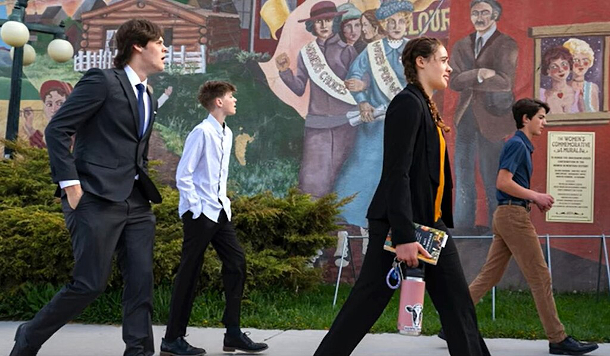
In Held v. Montana there were 16 plaintiffs who were between the ages of 2 and 18 years old when the lawsuit was filed in 2020. Pictured here are plaintiffs Lander Busse, Badge Busse, Taleah Hernandes and Mica Kantor. (Photo: Robin Loznak/Courtesy of Our Children’s Trust)
DOERING: So, Richard, you were actually in the courtroom every day of this trial. What was it like to be there and see this trial in action?
FORBES: It was really special to be there. I started covering this story about 16 months ago, and at that point there was no real guarantee they were going to make it to trial, it felt very far off. So just for that simple reason of having talked to these young people, three of them in particular for about a year or more, and then realizing that they've made it all the way to trial, and that this was the first youth-led climate trial in the United States, it was incredibly special. Beyond that, I think there was a pretty remarkable amount of energy in the room. I don't know if there was anyone who was supporting the state who was sitting in the audience. From everyone I talked to, it seemed as if the audience was made up of parents, and some supporters, and then also the expert witnesses. I think the plaintiffs' testimony was very powerful.
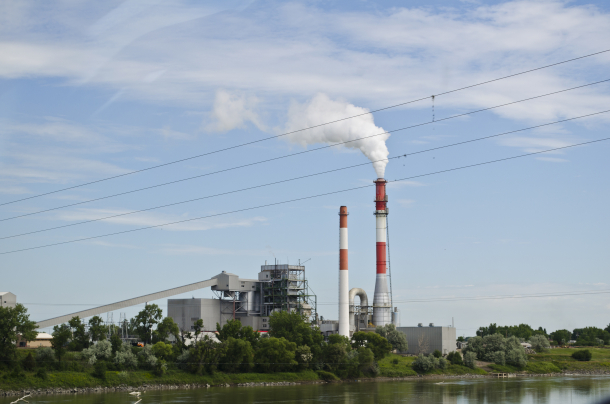
The state of Montana argued that its contributions to global greenhouse gas emissions are so small that the state could not have a meaningful impact on global climate or on the health and wellbeing of the plaintiffs, even with significant changes to Montana’s fossil fuel extraction and energy systems. (Photo: Tim Evanson, Flickr, CC BY-SA 2.0)
DOERING: So, the plaintiffs in this case are concerned about catastrophic climate change affecting the state of Montana. How has the state responded to those claims?
FORBES: In essence, what the state is saying is that they're being sued for a particular statute that's part of the Montana Environmental Policy Act and that is purely, according to the state, a procedural act. And what that means is that it doesn't have any teeth. So the state argues that they don't have the capacity to deny permits based on MEPA. And as a result, they can't do what the plaintiffs are asking for, and even if they could, they say that Montana's emissions are so small, when compared to the global total, that it wouldn't make a difference in Montana. That was the state's framing, that if everyone doesn't fix this right now, at the same time, no one should be required to try, and that it's not worth trying. The plaintiffs were saying the complete opposite, which is that anyone can do anything to try to help, no matter what it is, the act of simply trying to help is a powerful act.
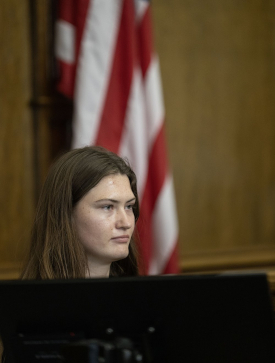
Youth plaintiff Rikki Held testifies in court (Photo: Robin Loznak/Courtesy of Our Children’s Trust)
DOERING: So I understand each of the 16 young plaintiffs in this case got involved because of their personal experiences with climate change in Montana, which I would imagine made it a very powerful trial to witness. Was there a particular moment or story during the trial that stood out to you as especially impactful or moving?
FORBES: Yeah, there were a lot of them. 12 of the young people testified, one father testified for his daughters. So, there were 13 different folks representing the plaintiffs' perspectives. I think the moment for me that stood out most clearly was, I spent a lot of time with Rikki Held in the reporting of my piece, and she was the first plaintiff to testify on the stand and the second witness in the trial overall. And she was asked what it felt like to be trying to work on her family ranch in temperatures that are 110 degrees, while there's wildfire smoke, and it was very emotional to watch her as she tried to hold back tears because of how awful it is for her to be trying to do manual labor, fixing fences and managing the cattle on her family ranch in those types of temperatures, and she did end up breaking down while trying to describe what that feeling felt like. That's only one of the many different ways that plaintiffs described their harms. A lot of it focused on wildfire smoke, being trapped in their homes unable to go out. People who suffer from asthma having trouble breathing, feeling like their throats were being closed up, unable to exercise, unable to do things that bring them joy, like spend time on the rivers. The plaintiffs' testimony was hard to listen to, and at the same time, it's their lived experience, it's the lived experience of everyone who lives in Montana nowadays.
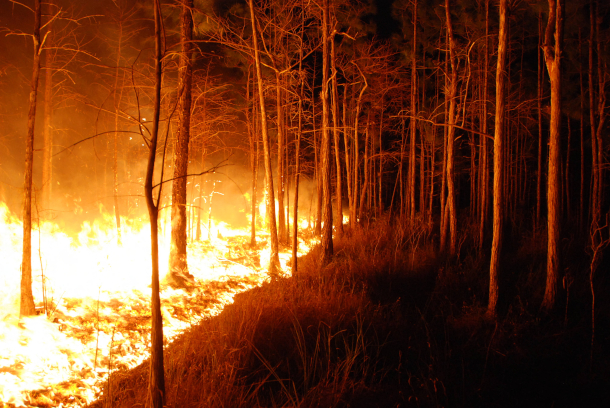
During the trial, Rikki Held and other plaintiffs in the case described the impact of living with frequent wildfires and wildfire smoke on their health and wellbeing. (Photo: US Fish and Wildlife Service, USFWS National Digital Library, Public Domain)
DOERING: You mentioned that Rikki Held, the lead plaintiff in this case, who the case is named after, is a young rancher in Montana. And that's a very traditional line of work in the state. I'm wondering, to what extent do you think that connects with people in the state who might not otherwise really care or pay attention to a case like this?
FORBES: In many ways, her background is what I think folks think of a Montanan. She grew up riding horses, herding cattle, out on the range on her family ranch, it's 7000 acres in southeastern Montana. And that's her story and she's extremely proud of it. It's a huge part of who she is, she loves living there. It was incredible to be able to go spend some time with her on that ranch, and I hope that her story resonates with people across Montana. One of the biggest things that I heard from Rikki and some of the other plaintiffs I spoke to is that they feel very strongly they're not fighting for any political background or for any political perspective. They're trying to protect their state, and they're trying to fight for Montanans, and they want to protect Montanans, no matter their background, no matter where they come from. I don't know how that would resonate with other folks, but I hope they hear what the kids are trying to say.
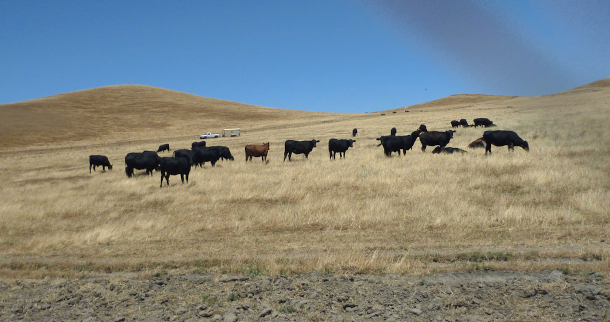
Rikki Held is a fifth-generation cattle rancher on a 7,000 acre ranch in Southeastern Montana, a traditional role in the state. She described how being a rancher exposes her to climate impacts like extreme heat and wildfire smoke. (Photo: Zug Zwang, Flickr, CC BY-NC-ND 2.0)
DOERING: So, Richard, to what extent were there any surprises in the courtroom?
FORBES: I think I had a particular perspective on this lawsuit that's somewhat unique in that I've been following it for more than a year. And so, a lot of my experience following this case has been trying to understand what arguments the defense was going to make, and trying to figure out how effective those would feel. And I think the thing that I was most surprised by when coming into the courtroom is that the state did not have the most compelling argument. The defense, and I think this was a legal strategy, they decided really not to wade into the climate change issues whatsoever. They had a scientist, Dr. Judith Curry, who had been brought in for a deposition, who was expected to question some of the numbers of the plaintiffs' experts and who was expected to call into question some of the representations about how climate change is affecting both the plaintiffs' health and the state of Montana. And the defense decided not to call her to the stand. So, what the state did do is they brought two different employees of the Department of Environmental Quality to be very specific about what the Department of Environmental Quality actually permits and what authority they actually have. And, to be clear, that's quite limited.
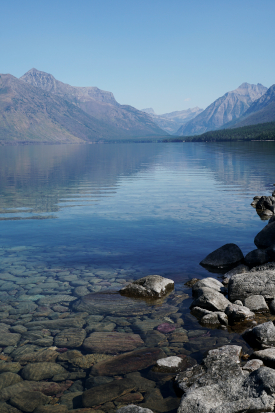
Plaintiffs in the case are hopeful that if they speak up and try to make a change, they can have a future they want in the state of Montana. Montana is a state known for its natural beauty, with sites like Glacier National Park renowned nationally. (Photo: Cameron Cress, Unsplash)
And then they brought an economist named Terry Anderson, who was asked to compare the numbers between Montana's greenhouse gas emissions and the global greenhouse gas emissions. And he represented certain numbers during his testimony to the state, which was about five to eight minutes at most, and it was intentionally small, that's what it felt like, because under cross examination, Terry Anderson was unable to say exactly where he'd gotten the numbers from. And he claimed, in particular, that there was 2022 information that was available from a particular government agency. And the plaintiffs then revealed that that data has not yet been published. So, it is a real mystery as to where he got his data specifically. And I think that characterizes how the entire experience of being in that courtroom felt, is that the plaintiffs showed up extremely prepared with a really beautiful presentation that was easy to follow, and they presented over five days a really compelling argument. The defense presented their case in one day.
DOERING: Richard, climate change is one of the most daunting challenges we face. How much hope are you hearing from the young people involved in this case?
FORBES: It's tempered hope, I think, what the plaintiffs are describing, because they're not ignorant of the fact that this one court decision is not going to fix climate change. At the same time, and this was put different ways by different plaintiffs, but, they're unwilling to live without hope. And so they've decided that they're going to believe that changes can be made, that they could have a future that they want, they could have a future that is healthy and that isn't characterized by wildfires, and by extreme drought, and by the rivers drying up. They are aware that that's a possible future, and they've decided that they're going to feel hope. And every single one of them when they finished their testimony was asked by the plaintiffs' attorneys, "What would it mean to you if you succeeded in this case?" and they each said in different ways, I would feel hope. Not that everything can be fixed, necessarily, but what they were saying is, I feel hope that my state is listening to me, that people are listening to me, that changes can be made.
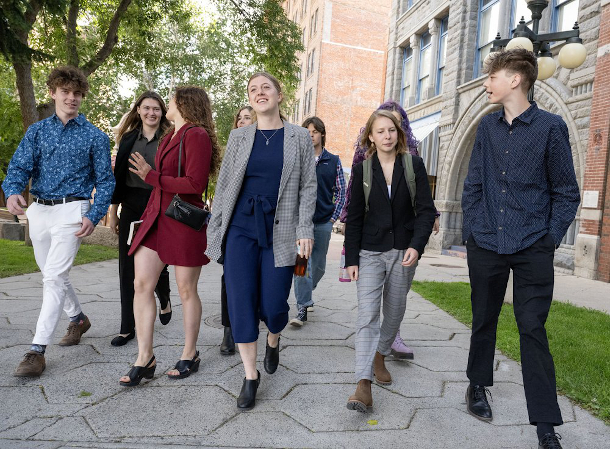
Youth plaintiffs walking and chatting outside the courthouse (Photo: Robin Loznak/Courtesy of Our Children’s Trust)
DOERING: So whether or not the youth plaintiffs actually win this case, to what extent do you think they've won in a way, just by speaking up?
FORBES: When I got involved in this story, I saw two different options for how I was going to cover it. There was the option where I was going to cover it from a very legally-minded perspective, trying to dig in as deeply as I could to the exact legal specifications of how this would work, what exact laws were being argued over, what exact strategies the lawyers were taking. I chose not to do that, one, because while that's all fascinating to me, I think it kind of misses the point a lot of the time with what this case actually is about, which is so much more about how people feel about climate change and what they're doing in relationship to it. This lawsuit matters, but it matters only in the context, I think, of how it's making these young people feel powerful and strong, and how they're hoping to then give that gift to the people who listen to their stories. It's so easy for this case to be turned into, like, very nitty-gritty legal stuff that really misses the point to me.
DOERING: Richard Forbes is an environmental journalist who covers the intersection between mental health and climate change. Thank you so much, Richard.
FORBES: Thank you.
Links
Living on Earth wants to hear from you!
Living on Earth
62 Calef Highway, Suite 212
Lee, NH 03861
Telephone: 617-287-4121
E-mail: comments@loe.org
Newsletter [Click here]
Donate to Living on Earth!
Living on Earth is an independent media program and relies entirely on contributions from listeners and institutions supporting public service. Please donate now to preserve an independent environmental voice.
NewsletterLiving on Earth offers a weekly delivery of the show's rundown to your mailbox. Sign up for our newsletter today!
 Sailors For The Sea: Be the change you want to sea.
Sailors For The Sea: Be the change you want to sea.
 The Grantham Foundation for the Protection of the Environment: Committed to protecting and improving the health of the global environment.
The Grantham Foundation for the Protection of the Environment: Committed to protecting and improving the health of the global environment.
 Contribute to Living on Earth and receive, as our gift to you, an archival print of one of Mark Seth Lender's extraordinary wildlife photographs. Follow the link to see Mark's current collection of photographs.
Contribute to Living on Earth and receive, as our gift to you, an archival print of one of Mark Seth Lender's extraordinary wildlife photographs. Follow the link to see Mark's current collection of photographs.
 Buy a signed copy of Mark Seth Lender's book Smeagull the Seagull & support Living on Earth
Buy a signed copy of Mark Seth Lender's book Smeagull the Seagull & support Living on Earth

